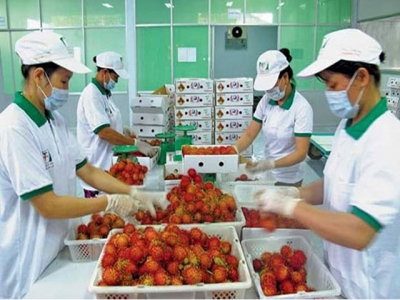Vietnamese help Thai businesses sell fruit to China

Vietnamese businesses that sell Thai fruits to China could create misunderstandings about Vietnam’s fruit export situation.
Thai fruits are exported to China via Vietnam
The news about Thai fruits being sent to China via Vietnam has appeared in many foreign newspapers. Most recently, Nikkei Asian Review quoted Chanthaburi exporters association as reporting that of the durian shipped to Vietnam, 80-85 percent are re-exported to China.
The other kinds of Thai fruits favored by Chinese, including longan, mango, coconut, jackfruit and banana, are also going to China via Vietnam.
According to Nguyen Viet Hung from the General Department of Customs (GDC), Vietnamese businesses don’t import fruits from Thailand under the mode of ‘temporary import for re-export later’. They simply import products for local consumption.
China is Vietnam’s vegetable and fruit export market which consumed 74.6 percent of Vietnam’s export turnover ($1.2 billion) in the first half of the year, an increase of 18.1 percent over the same period last year.
However, the imports have been both consumed in Vietnam and exported to China. In 2017, of the reported fruit export turnover of $3.5 billion, it was estimated that $800 million worth of products were imported from Thailand and re-exported to China.
“Vietnamese businesses, like Hong Kong and Singapore, have the right to buy products and resell the products for profit. A lot of products imported by Vietnamese businesses, for example, go through Singapore, for example,” Hung explained. “Logistics activities in Vietnam benefit from this.”
In fruit trade with China, Thailand exports more than imports from the country. China is the largest fruit export market for Thailand with 70 percent of market share.
Thai fruit exports to Vietnam have increased sharply since early 2018 when Vietnam lifted the tariffs on 669 tax categories, including fruits and vegetables imported from ASEAN countries.
China is also Vietnam’s vegetable and fruit export market which consumed 74.6 percent of Vietnam’s export turnover ($1.2 billion) in the first half of the year, an increase of 18.1 percent over the same period last year.
As for the fruit exports in the first five months of 2018, some sources estimated that the amount of Thai fruits re-exported to China amounted to 16 percent of the total fruit export turnover of $1.9 billion.
What worries Vietnamese is that because of the ambiguity in statistics about vegetable and fruit exports, farmers cannot get reliable information about market demand, which leads to bad investment decisions.
Farmers might rush to cultivate some certain kinds of fruits because they think the demand is very high from China. However, the products will not sell well, because the Chinese market wants Thai fruit. If so, farmers will suffer heavily from their cultivation decisions.
Meanwhile, the miscalculated figures may mislead the government when it sets up national development strategies, and cause people to entertain illusions about the nation’s fruit export achievements.
Có thể bạn quan tâm
 The King of Avocado brings the green to the Central Highlands
The King of Avocado brings the green to the Central Highlands They call him the King of Avocado for his unrivalled knowledge of the tree, the exceptionally high quality avocado seeds he supplies and his passion
 Vietnam mulls solutions to encourage organic agriculture
Vietnam mulls solutions to encourage organic agriculture The legal framework on supporting agricultural enterprises to shift to organic production has been set up, but this is not enough to kickstart the industry.
 Revenue from rice exports sees year-on-year increase of 32 percent
Revenue from rice exports sees year-on-year increase of 32 percent With 3.86 million tons of rice exported, Vietnam earned $2 billion from January to July.